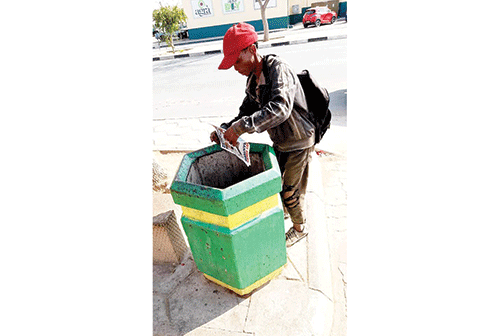Zebaldt Ngaruka
The high number of hunger-related deaths in the drought-hit Omaheke region has left traditional leaders worried.
Omaheke governor Pijoo Nganate recently reported that 263 people were admitted to hospital due to malnutrition, while 26 have died of hunger-related cases from January to June this year.
Earlier this year, the governor also appealed to traditional leaders and businesspeople in the region to come on board if the region is to fight malnutrition in a more coordinated manner.
Some traditional leaders shared their dissatisfaction with New Era, and suggested some possible solutions to crucial issues.
Chief amongst them is Otjombinde-based !Khuisi Traditional Authority’s Shorty Kandjengo, who said most people are unemployed, and survive on government food handouts.
“The food takes long to come, and there are no projects to support the needy in the community,” he said.
The Donkerbos-based leader said water scarcity is a concern in the area, and those taught how to cultivate would not manage without water.
He further recommended cattle allocation for the community to start with livestock farming, as land is already available.
Ovambanderu Traditional Authority’s acting chief Gerson Kunomundu Katjirua said hunger will persist for as long as the communities do not start changing their behaviour.
“Hunger affects all groups of people, starting from children to pensioners. The government is trying to assist, but their assistance is not controlled properly,” he said.
The acting chief added, “It saddened me to hear people died because of hunger as a community leader. There are many challenges in the country, but death from hunger is something one would hardly accept”.
He added that the drought relief food programme is helping “here and there, but that is not enough”.
“People should try by all means to help themselves, rather than waiting for the government to provide. We have instances of pensioners who cannot maintain their monthly payments,” he said, lamenting that pensioners, even with the little grants they receive, are followed by business people, who sell them items that are sometimes not useful.
“Alcohol abuse is at an alarming rate. Some pensioners are paying for alcohol accounts, rather than food accounts. These types of things must be controlled, and stopped,” he said.
Earlier this year, the office of the Omaheke Regional Council, under the stewardship of chairperson Ignatius Kariseb, carried out a campaign on the misuse of pensioners and vulnerable grants.
Sharing similar complaints is Frans Chapman, who is the senior councillor of the #Kaon/ae Traditional Authority, based in the Epukiro constituency.
He said hunger is real in the region, and the drought relief handouts do not help all in need.
“We, as the San community, are in great danger of hunger, as our main source of survival is the drought relief food that takes months to come. Some of us are trying here and there with our gardens, but water is a challenge due to poor rainfall,” he said.
Furthermore, Hoveka Traditional Authority chief Turimuro Hoveka said the tendency of people to ask or rely on someone to feed themselves must stop.
“We, as leaders, not only traditional leaders, but waterpoint committees, religious leaders, political leaders and peer group leaders – and even school principals must come out and help,” he requested.
The chief added that he found it funny that someone is paid N$20 000 monthly but is still preaching on the radio, asking the government to assist the needy in the community.
Hoveka recommended gardening projects as possible solutions to hunger, and called on fellow leaders to come and work together.
“We have to put our contributions together, and buy food for the needy in our community. We are responsible for our people,” alluded Hoveka.
Ovaherero Traditional Authority’s senior councillor, Turi Murise, attributed the hunger in the region to drought.
“When livestock are affected by drought, that automatically translates to human hunger,” he opined.
The senior councillor added that people will only talk badly about government when they are hungry.
“This hunger forced people to do crime, and the increase in stock theft cases in the region is caused by hunger as well,” he lamented.
He recommended that the government must start giving money to all people aged from zero to 59 years.
In May, President Nangolo Mbumba declared a National State of Emergency on drought.
The government scaled up its drought relief programme, targeting 340 000 households with food distributions, water provision, livestock support and seed programmes.
Over N$800 million has been set aside for the government’s drought relief programme.
The chairperson of Omaheke Regional Council (ORC), Ignatius Kariseb, told this publication that the government is working tirelessly to address the issue through its food distribution programmes.
He views that the lasting solution for hunger in the region and elsewhere in the country is backyard gardens.
He added that there must be sizeable gardens, measuring five to 10 hectares, for communities to survive in the region, which is also well-known for cattle production.
“The ORC has reached the state to do the soil and water testing to ascertain the types of crops we plant in the various constituencies to address hunger,” he said.
The chairperson is also calling on all stakeholders in the region to come forward, and assist the government in addressing hunger.
“I am positive that going forward with the support of all stakeholders, we will be able to address the situation of hunger currently facing our region,” he stated.
However, he is concerned about the selling of drought food by the beneficiaries.
“This is one challenge we need to deal with at community, religious and political level. We need to discourage it,” he said.
-zngaruka@yahoo.com
(Omaheke)
Caption:


